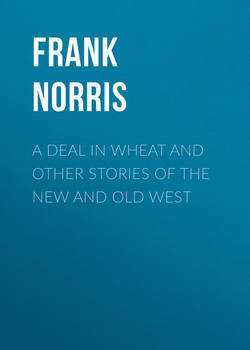Читать книгу A Deal in Wheat and Other Stories of the New and Old West - Frank Norris - Страница 2
A DEAL IN WHEAT
II. THE BULL—WHEAT AT A DOLLAR-TEN
Оглавление…–and said Party of the Second Part further covenants and agrees to merchandise such wheat in foreign ports, it being understood and agreed between the Party of the First Part and the Party of the Second Part that the wheat hereinbefore mentioned is released and sold to the Party of the Second Part for export purposes only, and not for consumption or distribution within the boundaries of the United States of America or of Canada.
"Now, Mr. Gates, if you will sign for Mr. Truslow I guess that'll be all," remarked Hornung when he had finished reading.
Hornung affixed his signature to the two documents and passed them over to Gates, who signed for his principal and client, Truslow—or, as he had been called ever since he had gone into the fight against Hornung's corner—the Great Bear. Hornung's secretary was called in and witnessed the signatures, and Gates thrust the contract into his Gladstone bag and stood up, smoothing his hat.
"You will deliver the warehouse receipts for the grain," began Gates.
"I'll send a messenger to Truslow's office before noon," interrupted Hornung. "You can pay by certified check through the Illinois Trust people."
When the other had taken himself off, Hornung sat for some moments gazing abstractedly toward his office windows, thinking over the whole matter. He had just agreed to release to Truslow, at the rate of one dollar and ten cents per bushel, one hundred thousand out of the two million and odd bushels of wheat that he, Hornung, controlled, or actually owned. And for the moment he was wondering if, after all, he had done wisely in not goring the Great Bear to actual financial death. He had made him pay one hundred thousand dollars. Truslow was good for this amount. Would it not have been better to have put a prohibitive figure on the grain and forced the Bear into bankruptcy? True, Hornung would then be without his enemy's money, but Truslow would have been eliminated from the situation, and that—so Hornung told himself—was always a consummation most devoutly, strenuously and diligently to be striven for. Truslow once dead was dead, but the Bear was never more dangerous than when desperate.
"But so long as he can't get wheat," muttered Hornung at the end of his reflections, "he can't hurt me. And he can't get it. That I know."
For Hornung controlled the situation. So far back as the February of that year an "unknown bull" had been making his presence felt on the floor of the Board of Trade. By the middle of March the commercial reports of the daily press had begun to speak of "the powerful bull clique"; a few weeks later that legendary condition of affairs implied and epitomized in the magic words "Dollar Wheat" had been attained, and by the first of April, when the price had been boosted to one dollar and ten cents a bushel, Hornung had disclosed his hand, and in place of mere rumours, the definite and authoritative news that May wheat had been cornered in the Chicago pit went flashing around the world from Liverpool to Odessa and from Duluth to Buenos Ayres.
It was—so the veteran operators were persuaded—Truslow himself who had made Hornung's corner possible. The Great Bear had for once over-reached himself, and, believing himself all-powerful, had hammered the price just the fatal fraction too far down. Wheat had gone to sixty-two—for the time, and under the circumstances, an abnormal price.
When the reaction came it was tremendous. Hornung saw his chance, seized it, and in a few months had turned the tables, had cornered the product, and virtually driven the bear clique out of the pit.
On the same day that the delivery of the hundred thousand bushels was made to Truslow, Hornung met his broker at his lunch club.
"Well," said the latter, "I see you let go that line of stuff to Truslow."
Hornung nodded; but the broker added:
"Remember, I was against it from the very beginning. I know we've cleared up over a hundred thou'. I would have fifty times preferred to have lost twice that and smashed Truslow dead. Bet you what you like he makes us pay for it somehow."
"Huh!" grunted his principal. "How about insurance, and warehouse charges, and carrying expenses on that lot? Guess we'd have had to pay those, too, if we'd held on."
But the other put up his chin, unwilling to be persuaded. "I won't sleep easy," he declared, "till Truslow is busted."
